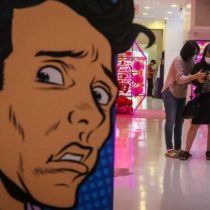
Sammi Yang began to realize that something was not right when she went to a doctor’s appointment in Berlin and was barred from entering the building.
While other patients entered through the door of the medical center, Yang, a makeup artist from China, had to wait outside in the middle of winter.
In the end his doctor appeared through the door and his first words were: “This is not personal, but…”
“He said, ‘We’re not letting any Chinese patients in, because of everything that’s going on with this virus coming from China,'” Yang told the BBC.
“There was no way to explain to him that I felt good and healthy” and that, at the time, I hadn’t visited China for a long time.
Dr. Li had posted a picture of himself on social media from his hospital bed, but then died. In the weeks following the virus began its worldwide expansion, numerous acts of discrimination have been seen against Chinese or people in Southeast Asia.
Although there is also empathy with Chinese coronavirus victims, particularly after the death of the person who first alerted about the epidemic, doctor Li Wenliang.
But discrimination against China and its citizens is not new: sinophobia is a well-documented phenomenon that has existed for centuries.
The many ways in which it has manifested itself during the coronavirus crisis reveals the world’s complex relationship with China in the present.
“Amazing place to stay in the West”
Rejection by the virus is expressed in several ways.
In places where Asians are a visible minority – such as Europe, Australia and the US – the European States are not the only ones in the world to have a view to the european and other interest. The U.S.-, synophobia is apparently driven by superficial stereotypes of the Chinese as unsettled and undercivilized people.
Being called plain and simple “a virus,” for example, has become quite common. Asian minorities are physically rejected in public or have become targets of racist insults and attacks.
Itulars such as “Yellow Danger”, “Chinese Virus Panda-Monio” and “Children of Chinese Must Stay At Home” have been published in French and Australian newspapers.
In addition, with the news that viruses originated in a market where wild animals were sold, and that it possibly resulted from a mutation of a bat virus, jokes about the Chinese eating anything that moves are common in networks Social.
While such commentary proliferates in Asia, anti-Chinese rhetoric in Western countries has an even more xenophobic tone.
A common theme is the suspicion that China has been dedicated to infecting local populations in nearby countries.
In Singapore and Malaysia, hundreds of thousands of people have made online petitions to ban Chinese citizens from entering their countries. And in fact, several countries have put in place a certain form of access control.
In Japan, some call the Chinese “bioterrorists,” while conspiracy theories about China’s intention to infect its own inhabitants, particularly the Muslim population, also circulated in recent months.
“In the West, China is seen as something distant and remote, so synophobia has part origins in ignorance. But in Asia, the center of that rejection is part of them being known very well,” Professor Donald Low, a Chinese public policy expert, told the BBC.
Discrimination has also provoked an anti-racist setback, as seen in this Italian graffiti that says: “There is an epidemic of ignorance around … We must protect ourselves.” In Asia, China’s shadow has spread over the centuries in the form of regional disputes, historical rejections and migratory waves.
More recently, the Asian giant’s claim to the South China Sea and the arrests of Uighurs in Xinjiang province have caused angry reactions, especially in southwest Asia, where there is a significant Muslim presence.
On the other hand, Chinese money and its huge investments in the region have been welcome, but they have also raised suspicions about China’s domination and the exploitation of resources without much benefits to local economies.
Even in nearby societies such as Hong Kong and Singapore there is a great anti-Chinese sentiment, partly because of long-standing concerns about Chinese immigration and identity, as well as Beijing’s influence.
In Nantes, France, a message could be read on a wall denouncing the “racist” stigmatization that Asians suffered in France since the start of the coronavirus epidemic in China.” Amazement and disdain”
Some believe that the current wave of sinophobia has a lot to do with how China has behaved, not only in this crisis but in recent years, on the world stage.
A widespread attitude towards China has been a mixture of “amazement and disdain,” Professor Low said.
For some, how China has handled the coronavirus crisis generates “incredible admiration for what they can do, such as building hospitals in days.”
“But they have also been criticized for their inability to control issues such as the trafficking of wild animals and have received complaints to be more transparent in their operation.”
The Chinese authorities admitted that they reacted slowly in the early stages of the crisis, and have been heavily criticized for the treatment of Dr Li Wenliang, who alerted his colleagues about the coronavirus globally and for this was put down police investigation.
President Xi Jinping seeks to project a strong and secure China with the message of a responsible global player and invests billions in countries around the world.
But China has not hesitated to show its muscles too, as seen in the fierce rhetoric of state media in the trade war with the United States, the accumulated evidence about its far-reaching state espionage program and the tireless claim over territories disputed.
“They want to be loved, but at the same time feared,” Professor Low explained.
China’s growth led to an increase in the number of tourists and students visiting and living in other parts of the world, leading to greater Chinese visibility.
Some sporadic reports of misbehavior and China’s growing presence have grown stereotypes that Chinese are rude tourists and that students abroad just want to showcase their wealth.
Of course, not everyone has the same perception about the Chinese. In South America, Asia and Eastern Europe, the vision is more positive, according to research from the Pew Center.
China says the virus mainly kills the sick and the elderly. Some observers – but also the Chinese government – point out that synophobia is the fault of their rivals, because of the political capital they seek with it.
In recent years, a considerable amount of anti-chinese rhetoric has come from the U.S., particularly since President Donald Trump’s administration, as Professor Barry Sautman, a sociologist at the Hong Kong University of Science and Technology, points out.
The United States, in fact, has a long history of sinophobia, more accurately with the Chinese exclusion law of 1882, which banned Chinese workers from entering when the so-called “Gold Rush” began.
“Now China is seen as the one that defies U.S. hegemony, so every aspect of the Chinese government has been heavily criticized. And as a result a lot of people around the world assume that, which has increased the synophobia, which already carried a significant historical burden,” Sautman explains.
“Kicking China While It’s Down”
China is not taking the attacks passively.
In recent weeks, Chinese state media has published opinion articles condemning discrimination and racism. Many of these articles are in English with the idea of reaching a global audience.
But they have also struggled with critical international media reports on the government’s management of the coronavirus crisis, even though some of the criticism has been broadcast in the local media.
Mouthpieces are being used all over the world, in this case near the River Thames in central LondonThe Chinese government speaks misinformation or unfair discrimination against China. Prominent TV presenter Liu Xin of state broadcaster CGTN describes this fact as follows: “Kick China while it’s down.”
Officially, the government has criticized countries, particularly the United States, for “creating and spreading fear” by enacting what it called “unnecessary” entry bans against Chinese travelers.
Meanwhile, anxiety and despair over discrimination are deepening for many Chinese and Asian minorities abroad, as the outbreak continues without an end in sight.
“I’m afraid, ” said Sammi, the Berlin makeup artist. He plans to avoid going out for the next few weeks.
It’s not just her experience with the doctor that scared her. A German-Asian friend was recently harassed at a train station, while a Chinese woman was brutally attacked on her way home. Berlin police classified it as a racist incident.
The woman claimed on Chinese social media that they called her “virus” and that she was beaten after defending herself.
“I don’t want to fight people when they call me viruses. All they know is what they read in the papers, you can’t make them change their minds,” Sammi said.
“Even if I show them my visa, I tell them I’m a permanent resident, all of that doesn’t matter. Because all you see is my Chinese face.”





